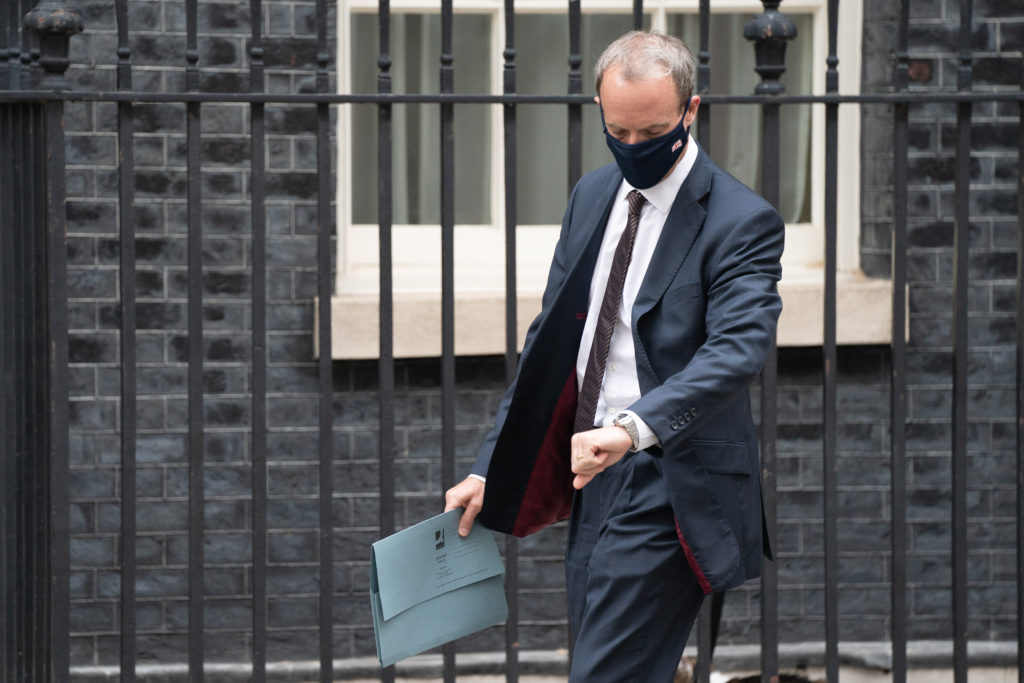Dominic Raab’s position as deputy prime minister and justice secretary is in jeopardy following allegations of bullying and intimidating behaviour from at least 24 officials. The mood music in Westminster is ominous, with Conservative MPs like perennial rebel Jake Berry now openly briefing against his party’s number two. Questions abound over the nature of the deputy PM’s conduct and, crucially, what Rishi Sunak knew of potential allegations in October when he restored Raab to government.
The allegations, which Raab vehemently denies, relate to his previous conduct during his time as justice secretary and foreign secretary under Boris Johnson and his time as Brexit secretary under Theresa May.
So far, the prime minister’s line has been consistent: he did not know of “formal” complaints against Raab when he appointed him in October.
It was a line repeated to reporters after prime minister’s questions last Wednesday, with the PM’s spokesperson insisting that the “usual processes were followed” with Raab’s appointment. “We were not aware of any formal complaints”, she added.


Similarly, the prime minister insists he has acted decisively in appointing a senior lawyer Adam Tolley KC to investigate the allegations, the moment he learned of “formal complaints”.
The nature and specificity of the denial raise the possibility that the prime minister knew “informally” of potential transgressions committed by one of his closest allies.
Indeed, several Conservative colleagues have shared tales about “robust” exchanges with the deputy prime minister during his storied career in government.
For example, former Wales secretary Robert Buckland has confirmed that he and Raab had “a disagreement” when they were both in cabinet, after it was reported Raab tried to get Buckland sacked as Welsh secretary last year amid a fallout over a disagreement over the Bill of Rights policy.
As Buckland explained to LBC on Monday: “Dominic and I have a disagreement about his bill of rights, clearly he wasn’t going to agree with the article that I did write in the Telegraph. I was talking about the government to come — that is the government post-Boris Johnson — and felt that it was entirely appropriate to do that”.
There are robust disagreements in politics. I’m old enough and ugly enough to hold my own corner, and Dominic is known for his robustness as well. There was a disagreement, but we’ve moved on
Sky News also understands that the prime minister was aware of the argument, which may not necessarily be characterised as bullying.
The pressure has also amped up in recent days with The Times reporting that cabinet secretary Simon Case, the UK’s top civil servant, was personally informed of a written complaint surrounding allegations about Raab’s behaviour while he was Justice Secretary last spring, under Boris Johnson. That is despite No. 10 saying they “were not aware of any formal complaints” when Sunak appointed his deputy PM in October.
The reports have also put fresh pressure on Case over whether he advised the prime minister not to appoint Raab.
According to The Times, officials told Adam Tolley KC — who is investigating the claims — that a complaint was made to ministry of justice permanent secretary Antonia Romeo (the chief civil servant of the justice department), who then escalated it to the cabinet secretary. An official told The Times: “Nobody said that it wasn’t a formal complaint.”
Asked whether No 10 agreed that any complaint that goes to the permanent secretary is indeed a formal complaint, a No 10 spokesman repeated: “The PM was not aware at the time of appointment of a formal complaint”. There was no specific denial of the report.
With Downing Street insisting that it is waiting for the conclusion of Tolley’s report before deciding Raab’s fate, we may have to wait some time before the semantic arguments of the debate are resolved. Indeed, the report is said to be “weeks” away.
The issue of what Sunak knew and therefore rests on some important, secondary questions. These include:
- Did Simon Case inform Sunak of any allegations made during Raab’s tenure as justice secretary under Johnson?
- Does this amount to a formal complaint?
- This notwithstanding, might Sunak have been aware “informally” of complaints made about Raab’s alleged conduct?
- And are such “informal” complaints relevant — i.e. what were their nature and could Sunak be expected to follow up on them?
The politics here are also very complicated. Raab is an ultra-loyal supporter of Rishi Sunak, and in his role as justice secretary he could be pivotal to mapping out the UK’s future relationship with the European Court of Human Rights (ECHR) and government policy on “small boats”.
And as Raab has proved under Sunak and Johnson, he is a minister who is consistently willing to defend his prime minister on the airwaves. His specific loyalty to Sunak was displayed in the summer leadership contest, battling doggedly for the recently resigned chancellor, even when it was clear Truss was the outright favourite for the Conservative crown.
So given Raab’s credentials as an experienced minister and with his loyalty to Sunak, the deputy prime minister would be difficult to replace.

